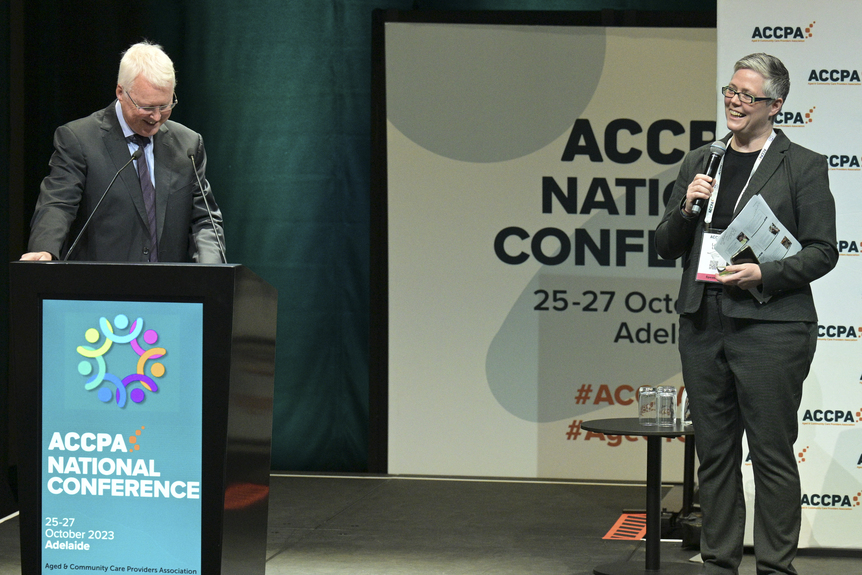Call for abstracts
We are delighted to extend an invitation to aged care providers and professionals, researchers, thought leaders and suppliers to present at the ACCPA National Conference 2024.
We are seeking industry experts with lived experience, learned knowledge or visionary ideas to share insights, exchange knowledge and discuss advancements in the field of aged care – to encourage our delegates to achieve excellence across their operations.
Our goal is to curate a diverse and comprehensive program that is strategic, solutions oriented, thought provoking and future focused, which is consistent with our conference theme ‘Age of Excellence: Inspire, Innovate, Impact’.
Note: All abstracts must be submitted by 16 August 2024. Submissions received after this date will not be considered.
Abstract format options
We are encouraging prospective presenters at the ACCPA National Conference 2024 to submit abstracts related to one or more of the 12 abstract categories in one of the following formats:

Strategic thought leadership
Abstracts that encourage high-level thinking, future focused solutions and the vision to explore opportunities for the industry.

Research-based abstracts
Abstracts presenting original research findings, data-driven studies, and evidence-based practices in aged care. These abstracts should contribute to the advancement of knowledge and provide valuable insights into the care of older Australians.

Innovative solutions
Abstracts that showcase novel approaches, technologies or programs that have the potential to improve the quality of care and overall wellbeing of older individuals. These abstracts should highlight practical applications and outcomes.

Case studies
Abstracts sharing real-life case studies or experiences that demonstrate successful strategies or lessons learned in providing aged care services. These should focus on replicable models that have shown positive impacts.

Best-practice implementation
Abstracts detailing successful implementation of best practices in aged care facilities or organisations. These should provide practical guidance for others looking to adopt similar approaches.


Abstract categories (12)
Click on the topic heading to expand for more information.
1. Workforce
In Australia, workforce challenges remain a significant concern for the aged care services industry, for providers and the recipients of care.
Aged care is one of our fastest growing industries, yet we are facing a diminishing supply of qualified staff.
There are concerns around workforce retention, an ageing workforce, attracting young people to the industry, workforce capacity in rural and remote areas, provision of adequate training, and support and mentoring for leaders.
We are seeking abstracts that explore:
- future trends, challenges and opportunities
- international pathways and labour mobility
- rural and remote workforce solutions
- solutions for workforce development, training, and leadership and mentoring
- workforce planning and sustainable workforce solutions
- strategies to improve retention and reduce turnover
- strategies to build resilience in the face of workforce challenges
- strategies to attract younger workers, including incentives and pathways, traineeships, diversity and inclusion strategies, and changing public perception of the aged care services industry
- supporting informal caregivers and volunteers.
2. Leadership
Aged care leaders carry the responsibility to build the capacity of their teams, drive key deliverables to ensure that organisations are profitable while meeting compliance and legislative requirements, and delivering on the service promise of quality and safe care.
Seasoned leaders may recount their leadership journey as fraught with insecurity and being overwhelmed with the investment required to transform teams, cultures and service provision.
This is why support for our aged care leaders is so important.
We are seeking abstracts that explore:
- leadership for the future including succession planning
- developing the next generation of leaders including engagement of younger people and collaboration with universities and other learning institutions
- innovative or highly effective leadership development and mentorship programs
- the skillset for managing highly effective teams.
3. Governance
Strengthening aged care provider governance is a key pillar of the aged care reform agenda, and the importance of building capacity in this area cannot be understated.
But how should providers embark on improving their governance systems, what does a proactive business mindset look like, what are the best strategies for a robust approach to all-import risk management and clinical governance frameworks, and how do they navigate ethical and legal issues?
We are seeking abstracts that explore:
- legislative and regulatory compliance
- risk management and insurance
- strategic planning in an era of reform
- clinical governance
- navigating ethical and legal issues
- building governance capacity.
4. Innovation, technology and data
Today, applying the right technology to everything from care delivery to asset management can produce a range of benefits for aged care providers and their ability to provide quality care, giving them a competitive edge.
Traditional approaches are becoming outdated and digitisation of data and processes is the new normal.
The application of new concepts on ageing and innovative approaches to service delivery have a range of benefits – from keeping families together in rural and remote areas to enhanced engagement with consumers – while the role of artificial intelligence (AI) is the new frontier for enhancing care delivery.
We are seeking abstracts that explore:
- Innovative business models
- implementation of digital health solutions
- use of assistive technologies and smart devices
- telehealth and other remote care advancements
- AI in aged care
- data security and privacy
- new technologies to support home care services
- rural and remote service innovation
- the role of staff involvement and training in innovation.
5. Research and best practice
Evidence-based research that informs best-practice approaches to aged care is vital for achieving excellence.
This is not just valuable in helping to select the health and wellness programs delivered in residential aged care homes, it is something that should inform point of contact with a prospective user of aged care services through to end-of-life considerations.
Therefore, research into the consumer voice is equally as important as studies that look at the range of issues related to ageing.
We are seeking abstracts that explore:
- pilots and case studies
- evidence-based research
- best-practice experiences.
6. Global insights
While there is enormous progress being made into achieving exemplary aged care in Australia, there are valuable lessons that can be learned from international experience.
Many of Australia’s aged care leaders have been exposed to new approaches and different cultural perspectives from study tours abroad) and have subsequently taken their operations to the next level.
What are the global insights that can inspire today’s aged care leaders to set a new standard in care?
We are seeking abstracts that explore:
- international best-practice experiences
- integration of global best-practice practice into the local care setting
- cross border collaboration
- global economic challenges and opportunities.
7. Home care
With the impending Support at Home initiative now pushed back to July 2025, there is more time to help home care providers prepare for a new way of doing business.
What are the challenges in home care and how can opportunities be leveraged, now and into the future?
What does a forward-thinking mindset look like in this sector and what is the role of the franchise model in terms of the way businesses are run, managed and governed?
We are seeking abstracts that explore:
- challenges and opportunities
- preparing for the new Support at Home program
- managing complex care
- innovations in home care
- insights into the franchise model of home care.
8. Care and service delivery
Continuum of care – from home care through to residential, acute and end-of-life care – is becoming an area of increasing interest.
With more Australians ageing in place, diversification of business models to meet consumer demand should be a consideration of all aged care providers, while continuous improvement to ensure quality care at every touchpoint, remains a must.
In rural and remote Australia, providers play a role beyond aged care and there are opportunities in relation to primary health and acute care.
We are seeking abstracts that explore:
- the strengthened Aged Care Quality Standards
- quality reviews and audits
- dementia care
- palliative and end-of-life care
- continuum of care models in retirement living communities
- rural and remote areas
- continuum of care (including acute care).
9. Retirement living and seniors housing
As more Baby Boomers look for safe, active and engaging retirement living communities, there is a strong desire for communities that are well run, have a good reputation, offer lifestyle benefits and those that provide care services as required.
In Australia, we are seeing new offerings in retirement living – from city towers co-located with services to sprawling landscaped gardens co-located with residential aged care – many of them with luxurious five-star inclusions.
For retirement villages, there is ample opportunity to innovate and secure a competitive edge.
We are seeking abstracts that explore:
- meeting future demand and expectations
- demolish or refurbish
- building and design
- concierge and care service delivery
- innovative financial models
- delivery of care services and co-location with residential care
- Retirement Living Code of Conduct and Australian Retirement Village Accreditation Scheme.
10. Finance and funding
Effective financial management is crucial to the delivery of high-quality services and the long-term viability of aged care providers.
Every aspect of financial management needs to be scrutinised – from treasury functions like deposits and cashflow, to asset management and investment opportunities – to properly meet increased regulatory requirements and standards.
We are seeking abstracts that explore:
- financial sustainability and long-term viability
- financial transparency and accountability
- funding models and securing adequate funding for new opportunities
- investment opportunities
- market trends
- the role of digitisation
- balancing cost control with the provision of high-quality care.
11. Cultural care and diversity
With more than one quarter of Australians born overseas, Australia is a truly multicultural nation, and our services must reflect this diversity to support culturally appropriate aged care.
Not just about understanding the nuances of culture and offering opportunities for cultural expression, but in-language experiences and support are also vital.
For First Nations elders, the challenge for service delivery is to allow care recipients to remain in community and on country, while people who identify as LGBTQI+ have their own particular needs.
What can providers do to support culturally and linguistically diverse (CALD) populations and do the strengthened Aged Care Quality Standards need to be nuanced to accommodate this important group?
We are seeking abstracts that explore:
- addressing the needs of CALD populations
- addressing the needs of Indigenous communities
- addressing the needs of other minority groups including LGBTQI+
- supporting the emerging aged care market
- supporting a diverse workforce
- wider considerations about policy and legislation.
12. Health and wellbeing
The primary role of aged care providers is to support and promote the health and wellbeing of their residents and clients.
Today, we understand the need for a holistic approach – catering to mental, emotional, physical and spiritual wellbeing – as a hallmark of best-practice care.
What does this look like in practice and what are the examples of excellence that can inspire the industry to greatness?
We are seeking abstracts that explore:
- allied health integration
- prevention and reablement
- food and nutrition
- mental health supports
- positive ageing
- additional services programs
- staff wellbeing.
Presentation guidelines
The ACCPA National Conference 2024 organising committee will place accepted abstracts into streams and presentation types at their discretion.
The following presentation types are available:
- individual presentation
- 20-30 minute presentation within a concurrent session
- inclusion as part of a facilitated panel discussion.



Submission guidelines checklist
To submit an abstract for the ACCPA National Conference 2024, go to the submission form and follow the prompts.
Also note the following guidelines:
- Abstracts must be no more than 400 words and must contain sufficient information to allow a delegate to appreciate what may be gained by attendance.
- Submissions must include a 100-character twitter-style synopsis to be used for promotional purposes.
- Submissions must include a 150-word biography of the presenting author and a high-resolution headshot (jpg, 2MB to 3MB).
- The abstract should be as informative as possible and be a true outline of content rather than a promise of what will be presented.
All abstracts will be considered on the basis of the merit of the individual submission and will be ranked according to the following criteria:
- relevance to conference themes and demonstration of outcomes addressed within the abstract
- relevance of content and attraction to the audience
- unique or innovative thinking.
Wait! Have you prepared all four items from the submissions guidelines checklist and read the terms and conditions for submissions?
If so, time to submit your abstract.
Abstract terms and conditions
All abstract submissions to the National ACCPA Conference 2024 must adhere to the following terms and conditions:
- All submissions must be made via the online abstract submission portal and adhere to the submission guidelines. Failure to do so will void your application. Emailed applications will not be accepted.
- Presentations are not to include promotions of specific products or services, unless they are integral to the context of the topic.
- All abstracts must be submitted by 16 August 2024. Submissions received after this date will not be considered.
- The ACCPA events team must be notified in writing of any additional or co-presenters by 20 September 2024 via email: [email protected]
- Registration is a condition of accepting the offer to present at the conference. All presenters must register and pay by 20 September 2024 to obtain the discounted abstract speaker full registration rate of $1,050.00 or day rate of $630 including GST. Presenters are responsible for their own accommodation expenses and travel to and from ACCPA National Conference 2024.
- By submitting an abstract, the author transfers copyright ownership to the conference organisers for potential publication in Aged Care Today magazine and on the conference website.
- The presenter will be advised in writing of the ACCPA National Conference 2024 organising committee’s decision but a specific reason for not including the presentation may not be provided. The organising committee’s decision is final.